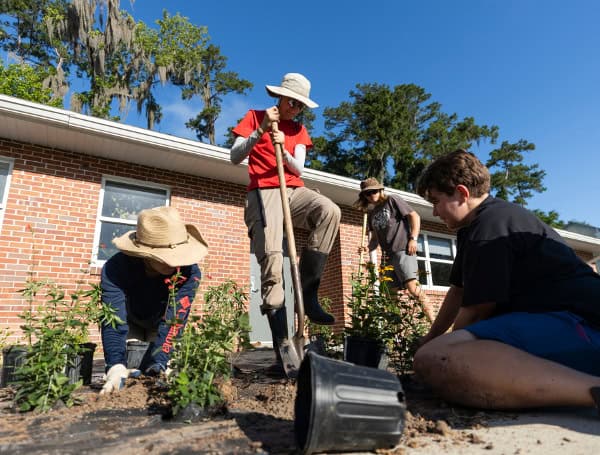UF/IFAS Field and Fork staff and students install a Florida-Friendly Landscaping™ Natural demonstration garden at the field office in late May. Fl

Florida-Friendly Landscaping™ (FFL) has created a new award to honor homeowners who install and maintain yards that help protect Florida’s water and natural resources.
The Florida-Friendly Landscaping™ Natural recognition is an alternative to the Silver and Gold tiers of the landscaping program’s current recognitions and focuses on plants and gardening methods that can thrive with minimal intervention. The goal of the recognition is to reward people who go above and beyond to create environmentally friendly landscapes that will protect water resources and create an ecological haven for pollinators and wildlife.
Claire Lewis, director of the Florida-Friendly Landscaping™ program – part of the University of Florida Institute of Food and Agricultural Sciences – said the recognition is special because it aims to protect Florida’s unique resources.
Read: Become A Master Gardener Volunteer In 2024
“Yards like these are a boon for Florida and good for future generations because they protect Florida’s water resources and provide space for pollinators to thrive,” she said.
The required practices for the Florida-Friendly Landscaping™ Natural recognition can be viewed on their website and focus on minimal inputs to the plants – things like water and fertilizer. For example, 75% of the plants used must be native to Florida, irrigation is used only if the plant shows signs of severe drought stress and no fertilizer is applied to the landscape after establishment.
For those interested in pursuing this recognition, two sites serve as prime examples of Florida-Friendly Landscaping™ Natural recognition. One is the Florida Fish and Wildlife Conservation Commission (FWC) office in Lake City.
FWC Regional Director Chris Wynn said the program has a common-sense approach for landscaping: place plants in areas where they feel most at home so they can thrive.
“Being able to work directly with our local UF/IFAS Extension agent and FWC Landowner Assistance Program biologist has been extremely helpful in learning about what types of native plants to select and how to manage them in our area,” he said. “We are excited to promote soil, water and wildlife conservation through the FFL Program at our FWC Regional Office in Lake City, and we invite anyone to stop by to see our ongoing natural landscaping project.”
Read: UF Scientists Finding New Way To Keep Broccoli, And Perhaps Other Vegetables, Fresher Longer
“This multi-organization partnership is an ideal example of how all Floridians are ‘Protecting Florida Together,’ said the Department of Environmental Protection’s Deputy Secretary Adam Blalock. “We are proud to continue our 30-plus year partnership with UF/IFAS supporting FFL.”
The second Florida-Friendly Natural site is a demonstration garden planted last week at the Field & Fork Gardens on the University of Florida’s campus, just west of the bat houses. About 100 native plants were planted, including scrub mint, blue-eyed grass, starry rosinweed and swamp sunflower.
Led by Master Gardener Volunteer program Statewide Coordinator Wendy Wilber, the project was created by the Florida-Friendly Landscaping team and installed by students from the UF/IFAS College of Agricultural and Life Sciences. The goal is to show how native pollinator plants can look beautiful in a home landscape while protecting and conserving natural resources.
Emily Taylor, executive director of the Howard T. Odum Florida Springs Institute, said the Natural recognition aligns with the institute’s goals of protecting Florida’s resources.
“The Florida Springs Institute is incredibly encouraged by the UF/IFAS FFL programs’ new Natural certification, recognizing the vital importance of promoting landscapes that preclude irrigation from groundwater sources or synthetic fertilizers,” she said. “This initiative aligns perfectly with our commitment to sustainable practices that protect our precious springs and natural resources.”
Help support the Tampa Free Press by making any small donation by clicking here.
Android Users, Click To Download The Tampa Free Press App And Never Miss A Story. Follow Us On Facebook and Twitter. Sign up for our free newsletter.
